London solidarity with refugees march: People from all backgrounds join tens of thousands in show of support
The march was joined by new Labour leader Jeremy Corbyn
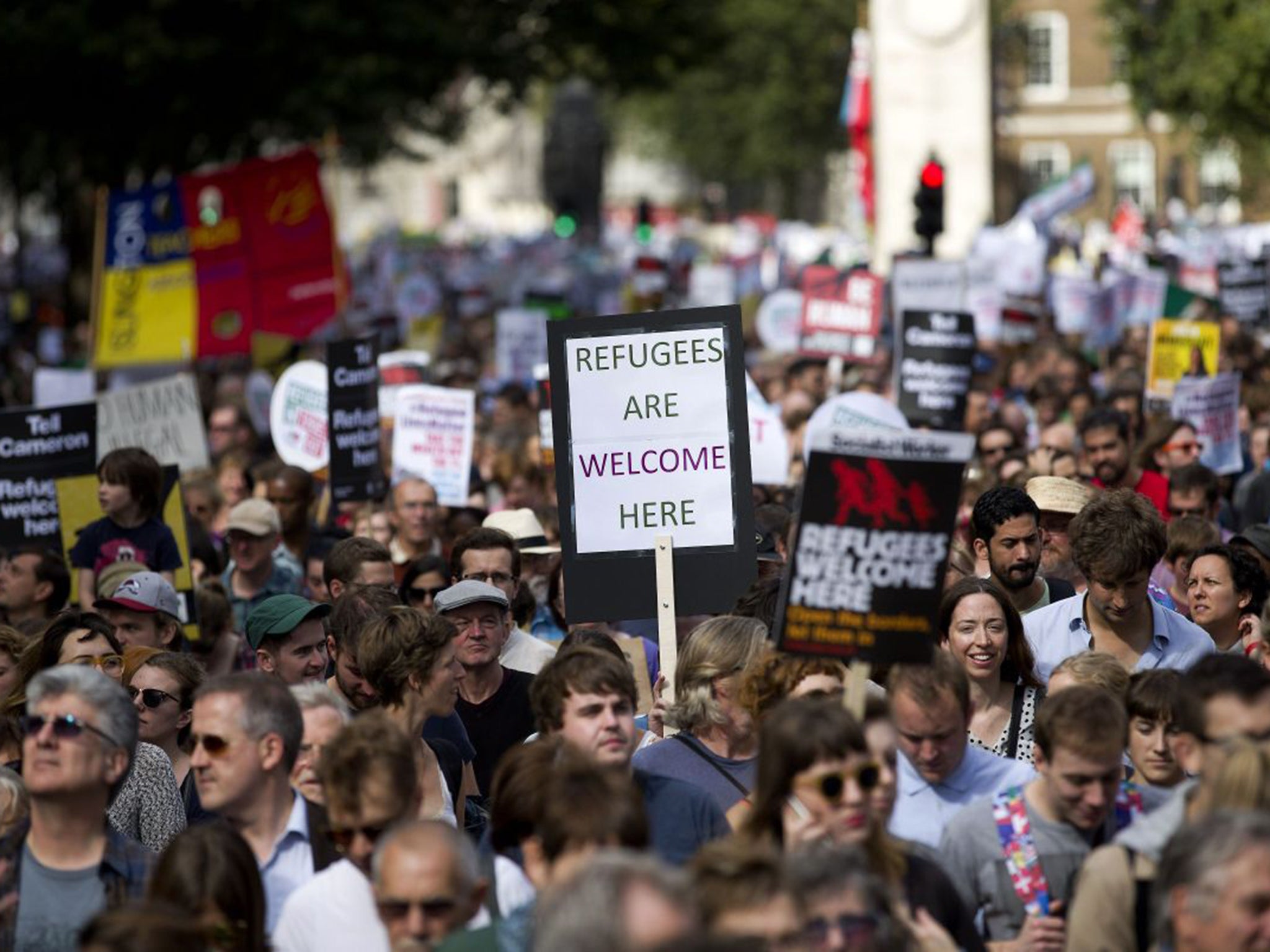
Your support helps us to tell the story
From reproductive rights to climate change to Big Tech, The Independent is on the ground when the story is developing. Whether it's investigating the financials of Elon Musk's pro-Trump PAC or producing our latest documentary, 'The A Word', which shines a light on the American women fighting for reproductive rights, we know how important it is to parse out the facts from the messaging.
At such a critical moment in US history, we need reporters on the ground. Your donation allows us to keep sending journalists to speak to both sides of the story.
The Independent is trusted by Americans across the entire political spectrum. And unlike many other quality news outlets, we choose not to lock Americans out of our reporting and analysis with paywalls. We believe quality journalism should be available to everyone, paid for by those who can afford it.
Your support makes all the difference.They came in their tens of thousands. Ordinary Londoners, families with face-painted children, young couples, pensioners and students with homemade placards.
They added their voices to the activists, campaigners, refugees new and old and politicians of the left, all calling on David Cameron to throw open Britain’s doors to refugees.
As they weaved from Marble Arch to Piccadilly in a vast line the Met Police said 50,000 people was a “conservative” estimate for the numbers, but by the time the marchers reached Parliament Square to be address by newly elected Jeremy Corbyn, in his first action as leader of the Labour Party, organisers were talking of nearer a hundred thousand, not tens of thousands.
“I’ve never seen Parliament Square looking so filled, so beautiful and so happy as on this day,” Mr Corbyn told the crowd, which blocked out the entire square in a sea of refugee welcome banners. He told the marchers, most of whom could not hear his poorly amplified voice, that Britain had a legal and moral duty to help “desperate people in desperate situation” from across the world.
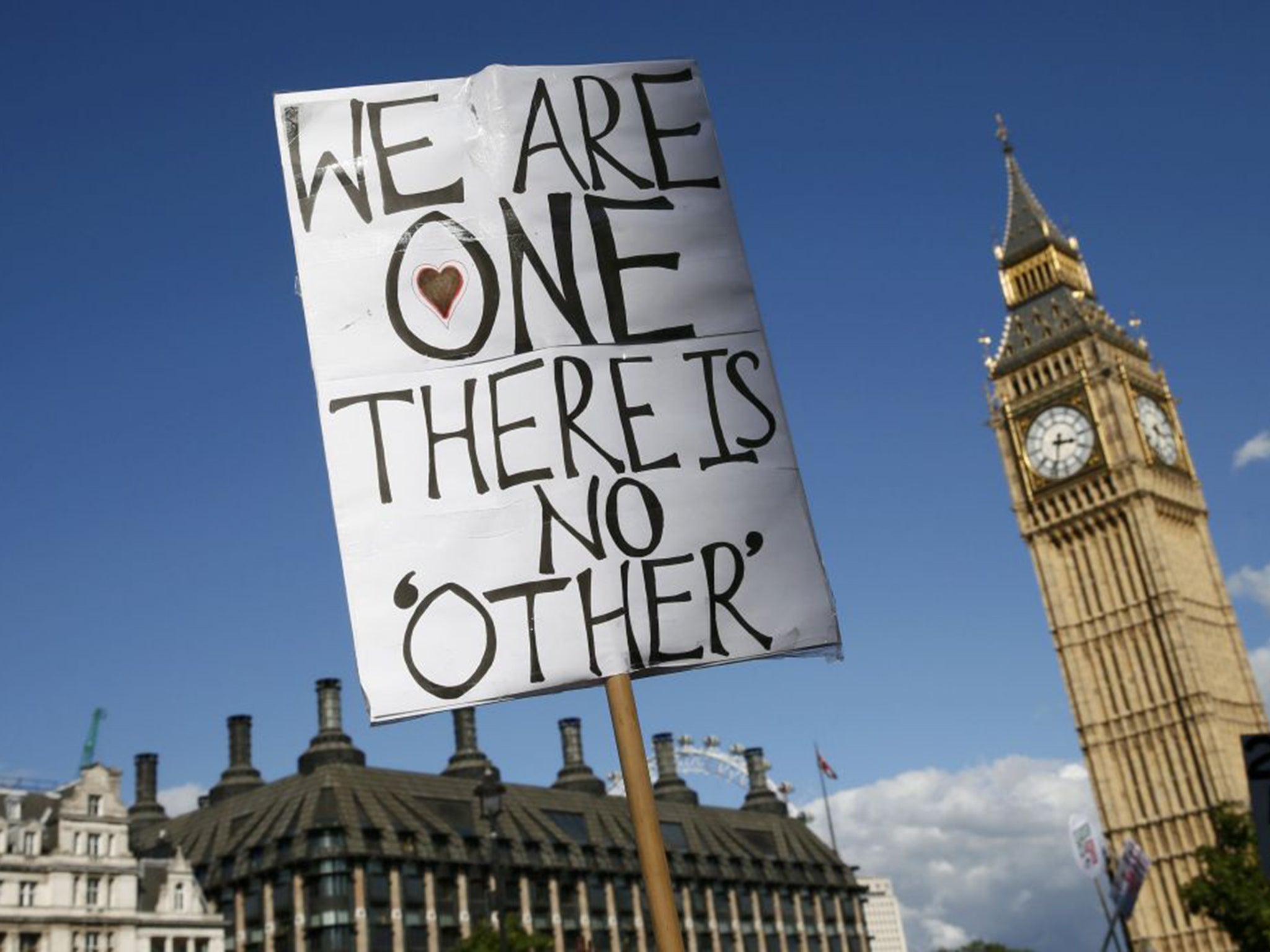
Earlier the march had started at Hyde Park Corner with a line of refugees leading the way and a chant of “say it proud, say it clear, refugees are welcome here,” echoing over central London. By the mid-way point at the Ritz on Piccadilly the crowd still stretched back to Marble Arch, as tourists and shoppers looked on or joined the crowd. At one point it was nine-year-old Maya Cortes, the daughter of a Chilean refugee, who led the call and response, while her mother Isabelle, 43, watched, wrapped in a Chilean flag. It was one of dozens of national flags on display, from Syria to Palestine and beyond.
"I came here in 1978 as a child,” Mrs Cortes said. “My daughter is the daughter of a refugee. Britain opened its doors to my mother. She studied English and worked hard to raise me. The Labour Party welcomed us and faith groups welcomed us, they knew it was Britain's moral duty. Cameron's response to the refugee crisis today is a joke. We must do more."
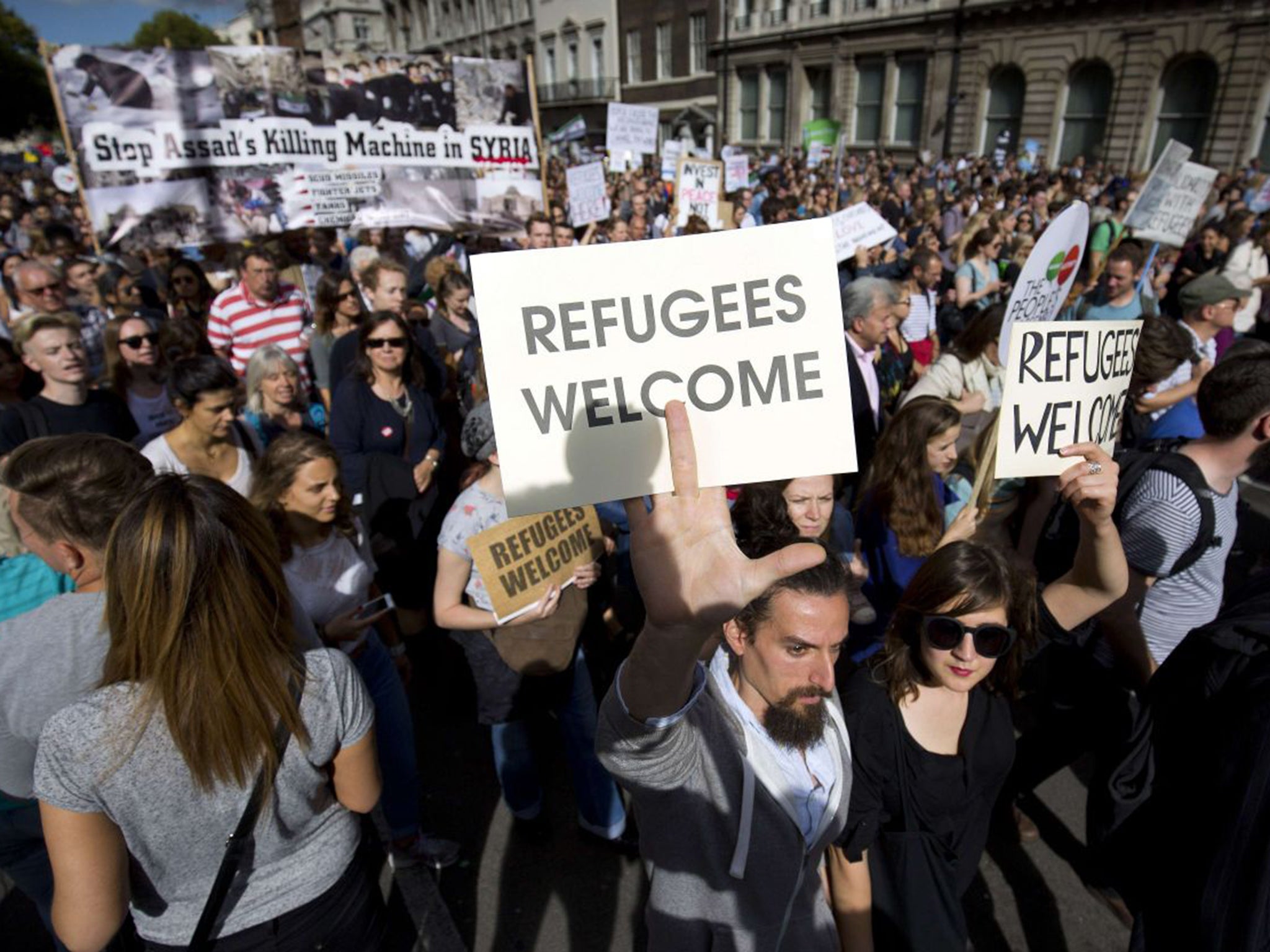
Not far behind was Ban, 47, a refugee living in Manchester, who fled Iraq into Syria in 2009 before being force to flee again to Britain last year. “I only came to Britain last year and already I am welcome,” she said. “It’s wonderful to see so many people here, welcoming refuges with one voice and saying that Britain needs to do more.”
Ban was marching with Stephen Hales, the chief executive officer of Refugee Action, he said: “Today's message could not be clearer. Britain welcomes refugees. In a hundred ways in a hundred towns and cities, people are stepping up to help. Today they are asking all our political leaders to do the same.”
Many marchers dismissed last week’s announcement that Britain would accept 20,000 refugees over five years as “laughable” compared to Germany’s commitment to accept as many as 800,000 refugees. “Britain’s response has been ridiculous,” said Professor Alfredo Filho, 51, a lecturer at SOAS University of London, who was standing outside of Downing Street. “Britain has a responsibility in general but also because a large part of the problem has been caused by Western intervention in the Middle East.”
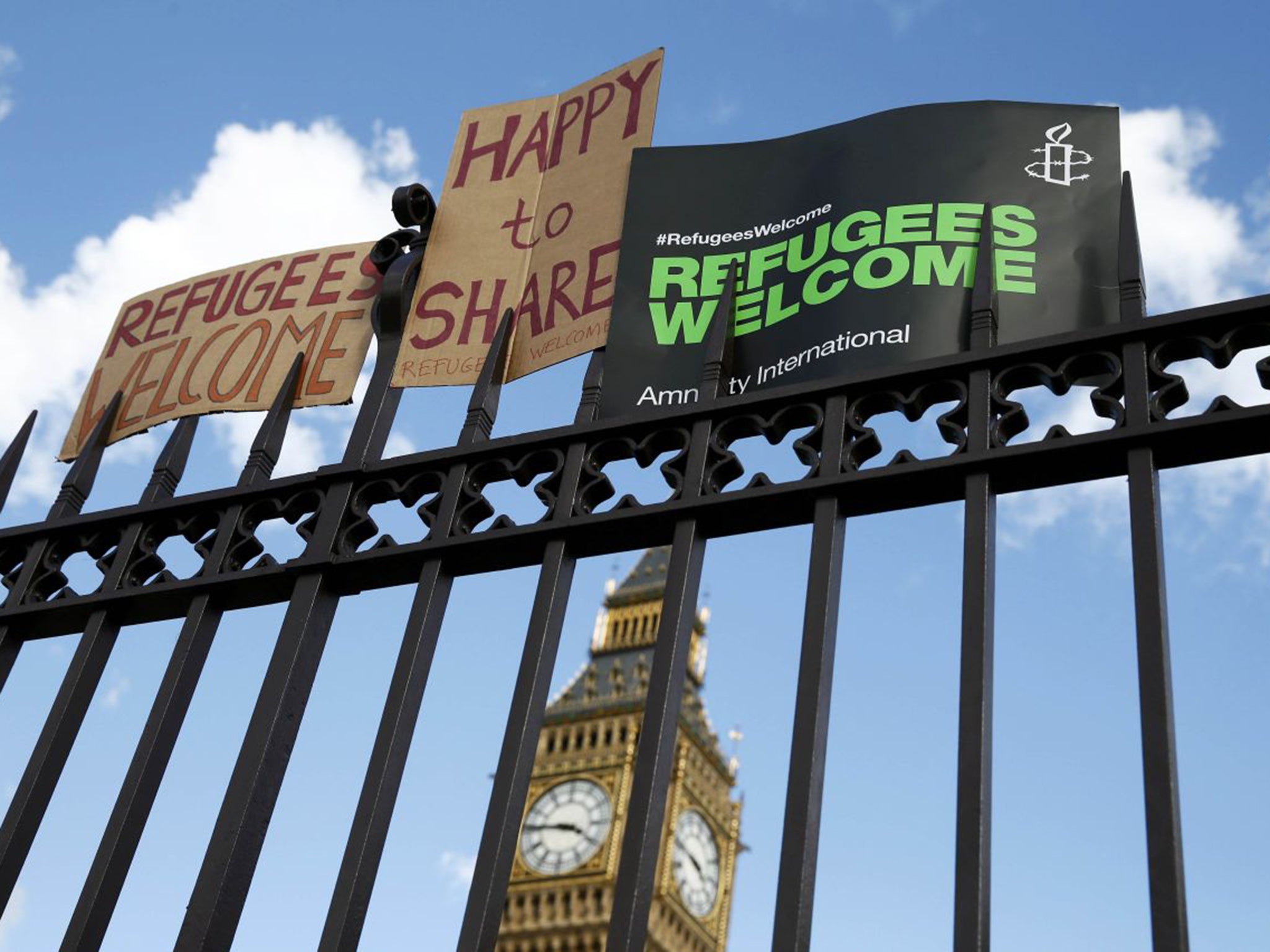
Liberal Democrat leader Tim Farron, who was marching with the crowd, told the Independent on Sunday that David Cameron should be “ashamed” by his weak response to the crisis. He said: “Cameron’s assumption is that the British people want to hear that we are full, [that refugees] are none of our business, [that they] should go away as they are trying to take advantage of us, but actually the British people as we can see today are much more decent than that.”
In Parliament Square the thronging crowd was welcomed by musician Billy Bragg, the bard of Barking, who announced he planned to attend his first Labour meeting since 1990 in a ringing endorsement of Jeremy Corbyn, prompting shouts from a few in the crowd that the event, should “be about the refugees”. By this point though, for the few thousand in hearing distance of the stage, the refugees march now also served as a Corbyn victory rally.
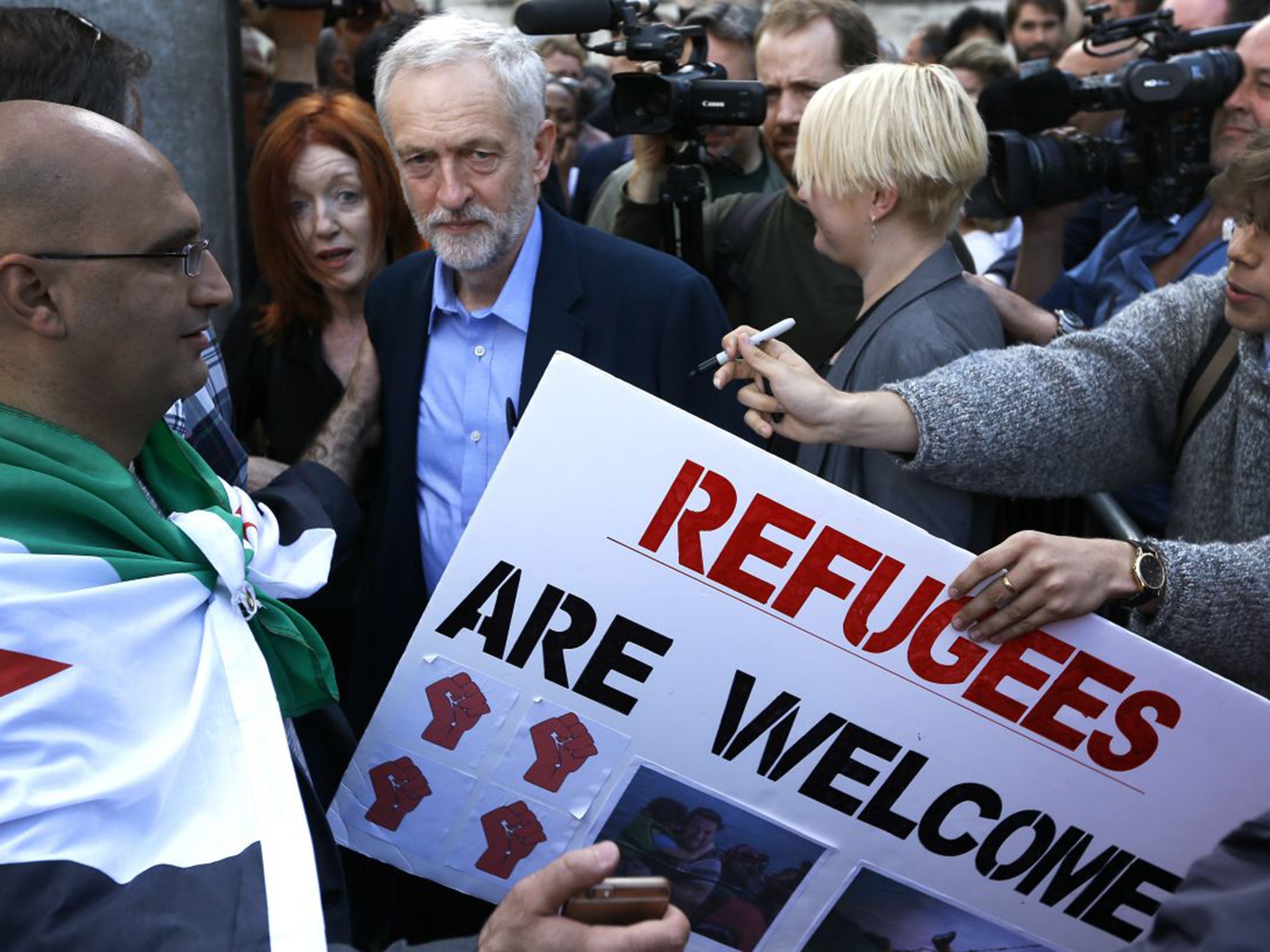
It was for campaigner Ros Ereira, who created the Facebook page the march sprang form, to say that the event wasn’t “political” but instead about a “shared vision to open the doors and stop people dying in the sea.”
Then came Jeremy. He came on stage to chants of “Jez We Can” from the crowd and vast applause as he urged David Cameron to find a “peaceful solution” to the conflict, signalling that Labour would be unlikely to support airstrikes on Syria under his leadership and would not join the clamour to “go here, invade there, bomb there, do this, do that”. He said: “Together in peace, together in justice, together in humanity, that surely must be our way forward.”
The Tories were quick to claim that this made Corbyn-led Labour a “serious risk to national security”, but in Parliament Square it was Bragg who jumped back on the microphone, attempting (and failing somewhat) to lead the huge crowd in a rendition of socialist anthem Red Flag.
Watching was 29-year-old student Clare Oakland. She had climbed up on a friend’s shoulders to hear the new Labour leader’s speech. “It was hard to hear but he talked about having an open heart and that’s important. He’s right. We need to talk about love and not just about borders”.
Join our commenting forum
Join thought-provoking conversations, follow other Independent readers and see their replies
Comments